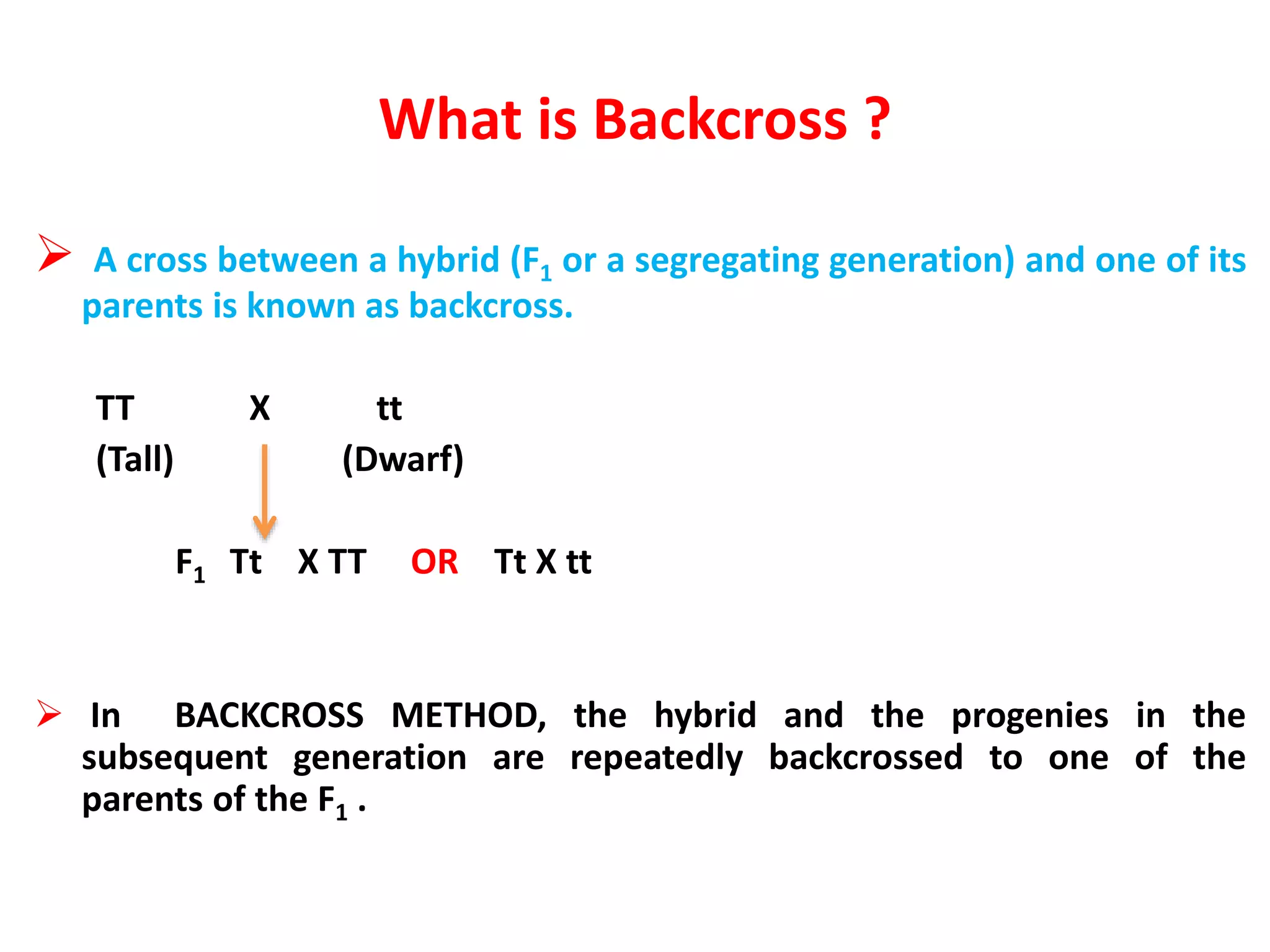What Is Backcross Method The objective of backcross method is to improve one or two specific defects of a high yielding variety A suitable recurrent parent must be available which lacks in one or two characteristics The character to be transferred must have high heritability and preferably it should be determined by one or two genes
The backcross method has been used extensively for transferring qualitative characters characters with clear phenotypes that are easy to identify in cross progeny such as disease resistance It is effective in both self and cross pollinated crop species Backcrossing is a two generation breeding protocol that starts by generating hybrid F1 mice between two inbred strains preferably distantly related one of them carrying the mutation of interest Then F1 mice are mated with a member of one
What Is Backcross Method

What Is Backcross Method
https://i.ytimg.com/vi/sfO1b332V1s/maxresdefault.jpg

Backcross Method Recessive Gene Transfer Understanding YouTube
https://i.ytimg.com/vi/hH8ySJeYEwE/maxresdefault.jpg

What Is A Backcross E T H O S
https://api.ethosgenetics.com/wp-content/uploads/2022/10/Punchline-X-RBX2-5x-Mag-Full-3.jpg
Nov 14 2019 nbsp 0183 32 This page provides an explanation and a visual representation of the backcrossing process and backcross populations Backcross breeding is an effective method to transfer one or a few genes controlling a specific trait from one line into a second usually elite breeding line Backcross can be defined as the method of crossing or mating a hybrid offspring with one of its parents or to a genetically identical individual in a trial to create infants which are genetically identical to the parent
What is Backcross Method Definition Backcross method is the one whose main objective is to incorporate desired gene either dominant or recessive to the highly productive commercially successful variety which lacks that specific gene Backcrossing is used extensively to incorporate alleles for novel traits into elite germplasm for a cultivar development program The novel alleles may be natural mutations or may be the result of mutagenesis or genetic engineering The strategy for conducting a backcrossing program is dependent on the type of cultivar being developed
More picture related to What Is Backcross Method

What Is A Backcross E T H O S
https://api.ethosgenetics.com/wp-content/uploads/2022/10/Punchline-x-RBX2-Macro-3.jpg

Spirit Pack Logo Stargazers Unite
https://stargazersunite.com/wp-content/uploads/2022/10/What-is-your-Website-Saying-About-You-1-1280x1280.png

What Is Deuterium IAEA
https://www.iaea.org/sites/default/files/whatisdeuterium00cover.jpg
Backcross breeding involves multiple cycles of crossing to the recipient line followed by selection of the trait to be transmitted It is used to assimilate simply inherited features from unadapted donor parents into recipient lines Backcrossing is a two generation breeding protocol that starts by generating hybrid F1 mice between two inbred strains preferably distantly related one of them carrying the mutation of interest Then F1 mice are mated with a member of one
This lesson explains the importance of the backcross method in the development of improved crop varieties The theory behind the method plus its strengths weaknesses and requirements will be discussed A breeding method used to move one or only a few desirable genes from a line donor parent often an agronomically poor or unadapted line to an elite line recurrent parent This is done by crossing a donor parent to an elite line and crossing offspring with the desired gene s back to the elite parent

Backcross Breeding Method PPT Free Download
https://image.slidesharecdn.com/10-210605062702/75/Backcross-Breeding-Method-2-2048.jpg

Breeder Blogs Illustrative Explanation Of Genetics Behind Marker
https://4.bp.blogspot.com/-EZ43iafITxA/WHxBE5dYlmI/AAAAAAAAAnU/nnHyDxaaOTw1Il2Xs5YVEN6-_y-r4V_7QCLcB/s1600/s2.jpg
What Is Backcross Method - What is Backcross Method Definition Backcross method is the one whose main objective is to incorporate desired gene either dominant or recessive to the highly productive commercially successful variety which lacks that specific gene